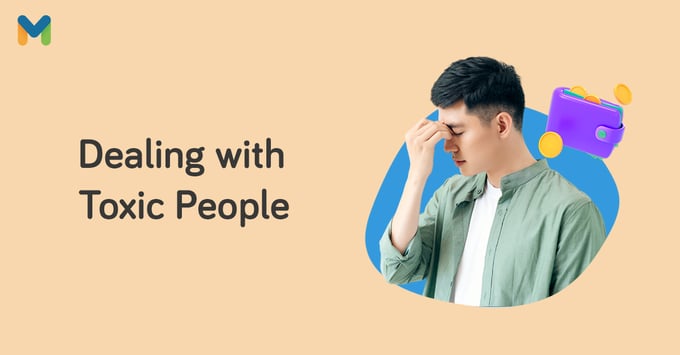You’ve heard a lot of people tell you the importance of saving money. You’ve read a lot of articles on how to do so, too. Personal finance is more accessible than ever, but for some reason, saving money is still easier said than done. Is it because you’re surrounded by financially toxic people without you knowing?
Similar to losing weight, saving money is a commitment that requires discipline and hard work. In the process, you’ll have to avoid certain types of people the way you have to avoid certain types of food.
Here’s a quick guide on toxic personality types to avoid when it comes to money, so you can start saving today.
Types of Toxic People You Need to Avoid
1. Your Kalabit-Penge Friend

Think about it: the concept of having a needy friend has been so ingrained in Filipino culture that it has its own term. At one point, you were friends with someone who hangs out with you only when you’re loaded. The kalabit-penge friend usually asks for a lot, ranging from food to even money. Those harmless “Libre ka naman!” quips could end up costing you.
How to avoid them: If you’re still with this toxic friend, stay far away. You don’t need a leech when you’re planning to save as much money as possible. Avoid these types of toxic people– they’ll surely derail your financial plans. Instead, spend more time with friends you trust the most.
2. Your Judgmental Relative
Admit it–you have a few relatives you avoid during family gatherings. They usually either say you gained weight or demand to know why you haven’t got a significant other yet. But the worst they can do is discourage you from reaching your financial goals by flaunting their wealth and saying you can’t do it because you’re not them. That totally sucks.
How to avoid them: So how do you avoid a judgmental relative? Just don’t talk to them. But things may get tricky when they’re your neighbors, or worse, when they’re living with your family. In that case, you should try to avoid talking to them about your financial goals. Don’t let your judgmental relatives tear you down and distract you from achieving the best version of yourself.
Read more: Ballin’ for Money: The Highest-Paid NBA Players
3. Your Party Animal Coworker

Also known as bad influence personified, the party animal co-worker is that one guy or gal who always suggests a night out after clocking out. They expect you to enjoy partying like they’re the ones paying. Even during the work-from-home era, they still make your whole team indulge in online mukbang sessions, prompting you to spend more on food deliveries.
How to avoid them: If you want your wallet to stop scolding you, avoid hanging out with your party animal co-workers after you log out. Find all the strength in the world to refuse their advances. Let your FOMO subside while they’re out there having fun by focusing on all the money you’re saving. Once you’re all set financially, you can have all the fun you want.
4. Your Crush

Okay, you don’t have to necessarily lump your crush with the other types of toxic people on this list. But if you’re serious about saving a certain amount of money, your love life has to take a break as well. You can’t devote yourself to two life-changing commitments at the same time. Why? Because dating costs money.
How to avoid them: Avoid dating–for now, at least. Think about it. Making a good first impression will already cost you a lot: new clothes, grooming, all that stuff. And how about the date itself? It’s not like fine dining doesn’t cost an arm and a leg. Even online dating can still cost you money in terms of internet bills or mobile data. Remember: love comes and goes, but financial stability is worth working hard for.
5. Your 2 A.M. Self

Bet you didn’t see this twist coming. If there’s one thing “How I Met Your Mother” taught us, it’s that nothing good ever happens after 2 a.m. But thanks to revenge bedtime procrastination[1] or that phenomenon where people sacrifice sleep for some more me-time at night, online shopping sprees tend to happen at midnight, along with other incredibly ill-advised life decisions.
How to avoid them: Yes, you should also distance yourself from the toxic version of yourself when you’re trying to save money. Because sometimes, you are your greatest enemy. To avoid your 2 a.m. self, the solution is simple: get a good night’s sleep. Aside from saving yourself from the allure of online shopping apps, it will also give your brain a rest, leading to better decision-making the next day.
6. The Irresponsible Borrower
There’s a great chance you’ve already encountered people like this. It could be your financially toxic friend or a family member who thinks you’re their on-call savior.
Lending money is all right. It’s a compassionate act, especially if the borrower is in dire need. But it can also become one of your worst financial decisions. Remember, there are people who borrow money from their friends or relatives just to fund extravagant purchases.
How to avoid them: How do you avoid someone who relies on you for help? First, you must learn how to tell the difference between being a helper and being an enabler.
Helpers recognize that there’s always another way to do someone a favor besides lending cash. On the other hand, enablers stay at someone’s beck and call. Case in point: when you become your family or friends’ personal revolving credit card, you enable them to depend on you. In reality, they have the ability to fend for themselves.
Once you know the difference between helping and enabling, you become a wiser lender.
Another way of dealing with a financially toxic friend is to put everything on paper. Before you turn over cash, draft an agreement with the borrower. Make sure to include the terms, such as the due date and interest.
When you collect money from your lender, don’t feel shy and awkward. Be assertive but not aggressive. It’s your money, so it’s just right to ask them to return it on the agreed date.
Sure, avoiding borrowers or saying “No” is wise. But if you’re the type of person who can’t refuse, you must still draw the line. Remember, you can always provide non-financial help. For instance, you can offer your brother transportation if his car is broken and you have no money to lend for the repair.
7. The Shopaholic Friend

There’s nothing wrong with splurging, especially if you have the budget for it. And there’s certainly nothing wrong with having shopaholic friends. But you may want to avoid them if their habits start to permeate your life.
Since your shopaholic friend may be a self-proclaimed tastemaker, there’s a chance they’ll judge your lifestyle choices. They may ask why you’re still using your 2015 Android phone or why you haven’t “invested” in a Louis Vuitton wallet yet.
You’re safe from this if you have high self-esteem. But self-conscious people may get influenced by such unfair judgment and eventually feel like they need to keep up with their friends.
Some chronic shopaholics also rely on credit to fund their purchases. Soon enough, they may turn to you and borrow money.
How to avoid them: Don’t join their shopping sprees. Stay firm and tell them you don’t have extra cash for a new pair of sneakers or a brand-new gadget. If social media posts of their splurges make you feel insecure, remember that you can always hit that “Unsubscribe” or “Unfollow” button.
8. The Optimist
“YOLO! Mababawi mo naman pera. Pero ang time, ‘di na!”
Sounds familiar, right? The optimist is either someone who believes it’s okay to blow their money since they can earn it again or someone who romanticizes their lack of money and believes someone else will provide.
They could be that financially toxic friend who forced you to book that Boracay trip despite knowing you didn’t have the budget. Or they could be that cousin who believes starting a new family is more important than having money.
Newsflash: that’s Filipino toxic positivity. A YOLO lifestyle is only good at first. Eventually, reality sets in when you find yourself paying off a lot of debts and or lacking the savings to cover an emergency.
Similarly, romanticizing deprivation is more damaging than helpful. Statements like “Don’t think about your debts and stay positive” and “Everything will work out in the end” warp the way you view reality and keep you from working through your real problems.
This is not to say that you should be pessimistic. Instead, you should be realistic. This means planning for the future while enjoying the present.[2] It’s a little tricky, but if you know your priorities, you’ll be all right.
How to avoid them: How should you avoid a person with this mindset? You don’t–you face them head-on. When an overly optimistic friend pushes you to blow your money on an unplanned expense, explain the negative consequences you’ll suffer if you heed their advice. It could also serve as a wake-up call for them.
9. The Pessimist
On the opposite end of the spectrum is unnecessary pessimism. Pessimism isn’t exactly bad; it actually counterbalances your optimism, giving you a more realistic view. But an unhealthy amount can be harmful. It will make you doubt your choices.
A person with a defeatist attitude usually wallows in pity parties. Do you have a co-worker who believes they’ll never be successful in their career because it’s already written in their stars? Or a friend who constantly tells everyone they don’t have the talent and opportunity to make it big?
The pessimist may also offer unsolicited advice. Say you’re starting a business, and a family member or friend who doesn’t know any better tells you your plans aren’t enough or your idea isn’t unique. They may even point out the potential failures of your would-be venture. This may make you second-guess your decisions and discourage you from continuing your plans.
How to avoid them: Try not to dwell too much on a toxic pessimist’s words. Instead, find people who have the same mindset as yours. More importantly, focus on your self-esteem. When you have confidence in yourself, your abilities, and your choices, the ka-negahan from defeatists won’t affect you.
10. The Family Who Treats You Like Their Piggy Bank

It’s a generational curse. The toxic Filipino family culture manifests itself when your household treats you like a piggy bank. It happens when your parents guilt-trip you into giving them money even when your paycheck’s barely enough, or when your relatives come running to you for help whenever they need something (e.g. mobile load, kids’ tuition fee, and the like).
Depending on your family dynamics, you might be labeled an ingrate if you refuse to give something.[3] But don’t let this get to you, even if such hurtful words come from your parents. Remember that it’s your parents’ responsibility to feed, raise, and educate you. Yes, it’s okay to give, but remember you’re not obliged to do it.
If you have an understanding family, you can always explain your circumstances. Tell them you have other plans in life while assuring them that you’ll help when there’s a chance.
How to avoid them: It’s difficult to avoid a toxic person in the family. However, if your parents, siblings, and relatives continue to aggressively demand something from you, it’s time to distance yourself. You’re a grown adult, so you always have the choice to leave and live on your own if you have the means.
Sometimes, breaking toxic multi-generational family patterns requires leaving behind the people who perpetuate them.
Final Thoughts
Discipline is the name of the game when it comes to saving money. Even if you set aside a huge portion of your monthly earnings, you won’t be able to save if you don’t have the discipline to back it up.
Unfortunately, this entails removing certain people from your life. If you’re wondering how to avoid a toxic person when it comes to money, it’s not easy. But when you finally shed these financially toxic people from your life, you'll be able to enjoy the fruits of your labor in no time.

Sources:
- [1] What is “Revenge Bedtime Procrastination”? (Sleep Foundation, 2021)
- [2] Why Realistic Thinking is Better Than Optimistic Thinking (WebMD, 2021)
- [3] How Utang ng Loob Made Filipino Families Toxic (Modern Parenting, 2022)









